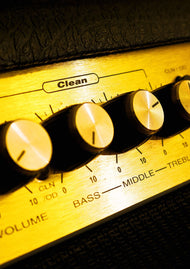The Impact of Music on Mental Health: Benefits and Tips
Music has long been a universal language, capable of evoking a range of emotions and memories. Its impact on mental health is profound, with numerous studies highlighting its benefits. Whether it's through listening, creating, or performing, music can significantly enhance mental well-being. In this blog, we'll explore the various ways music impacts mental health and provide tips on how to harness its benefits.
The Psychological Benefits of Music
-
Mood Enhancement One of the most immediate effects of music is its ability to improve mood. Listening to upbeat, joyful music can elevate feelings of happiness and reduce feelings of sadness. Conversely, soothing music can help calm anxiety and promote relaxation. This mood enhancement is linked to the release of dopamine, a neurotransmitter associated with pleasure and reward.
-
Stress Reduction Music has a unique ability to lower stress levels. Listening to calming music has been shown to reduce cortisol, the body's primary stress hormone. This can be particularly beneficial for individuals dealing with chronic stress or anxiety. Incorporating music into daily routines, such as during morning commutes or evening wind-downs, can create a more relaxed and stress-free environment.
-
Emotional Expression Music provides a powerful outlet for emotional expression. For individuals who find it difficult to verbalise their feelings, music can be a medium to convey emotions. Writing lyrics, composing melodies, or simply playing an instrument can serve as a therapeutic activity, helping to process and release pent-up emotions.
-
Memory and Cognitive Function Music can also enhance cognitive functions such as memory and attention. Studies have shown that listening to music can improve memory recall and assist in learning. This is particularly evident in individuals with Alzheimer's disease or dementia, where familiar music can evoke memories and improve cognitive function.
-
Social Connection Participating in musical activities, such as group performances or community choirs, fosters social connection. This sense of belonging and community is crucial for mental health, helping to combat feelings of loneliness and isolation. Music can bring people together, creating shared experiences and strengthening social bonds.

Tips for Incorporating Music into Your Mental Health Routine
-
Create a Personalised Playlist Curate a playlist that resonates with your current mood or desired emotional state. For relaxation, consider including tracks with slower tempos and soothing melodies. For an energy boost, add upbeat, high-tempo songs. Personalizing your music experience can make it more effective in enhancing your mental health.
-
Explore Different Genres Don't limit yourself to one genre of music. Exploring different types of music can introduce you to new sounds and emotions. Classical music, for example, is known for its calming effects, while jazz can stimulate creativity and improvisation. Experimenting with various genres can help you discover what works best for you.
-
Engage in Active Listening Active listening involves fully immersing yourself in the music, paying attention to the lyrics, melodies, and rhythms. This mindful approach can deepen your connection to the music and enhance its therapeutic effects. Set aside time each day to practice active listening without distractions.
-
Learn to Play an Instrument Learning to play an instrument can be a rewarding and therapeutic experience. It not only provides a creative outlet but also requires concentration and discipline, which can divert attention from negative thoughts. Whether it's the piano, guitar, or drums, playing an instrument can be a form of self-expression and stress relief.
-
Join a Music Group Joining a choir, band, or music group can provide social interaction and a sense of community. These activities offer opportunities to connect with others who share similar interests, creating a support network. The act of making music together can be incredibly uplifting and fulfilling.
-
Attend Live Performances Experiencing live music can be exhilarating and inspiring. Attending concerts, festivals, or local gigs can lift your spirits and provide a break from routine. The communal aspect of live music, where you share the experience with others, can also enhance its emotional impact.
-
Use Music for Mindfulness and Meditation Incorporate music into your mindfulness or meditation practice. Soft, ambient music can create a serene environment conducive to relaxation and introspection. Guided meditations with musical backgrounds can also help you stay focused and grounded.
-
Create Your Own Music You don't have to be a professional musician to create your own music. Writing songs, composing melodies, or even experimenting with digital music production can be highly therapeutic. Creating music allows you to channel your emotions into a tangible form, providing a sense of accomplishment and self-expression.
The impact of music on mental health is undeniable. Its ability to enhance mood, reduce stress, express emotions, improve cognitive function, and foster social connections makes it a powerful tool for mental well-being. By incorporating music into your daily routine through personalised playlists, active listening, learning instruments, joining music groups, attending live performances, and using music for mindfulness, you can harness its benefits and improve your mental health. Remember, the key is to find what resonates with you and make music a regular part of your life. If you would like to learn a new instrument, please do not hesitate to get in touch with out team today. Click Here to learn more about the music lessons we offer.









![Redding 3/4 Size Acoustic Steel String Guitar [RED34]](http://www.caringbahmusic.com.au/cdn/shop/files/RED34.jpg?v=1761031445&width=480)

![Redding Dreadnought Steel String Acoustic Guitar [RED50]](http://www.caringbahmusic.com.au/cdn/shop/files/RED50.jpg?v=1761031548&width=480)

![Redding 3/4 Size Dreadnought Electric/Acoustic Guitar [RED34E]](http://www.caringbahmusic.com.au/cdn/shop/files/RED34E.jpg?v=1761031472&width=480)

